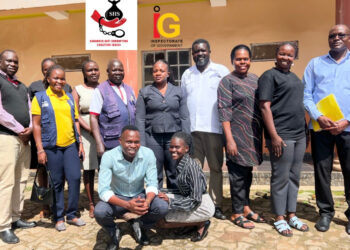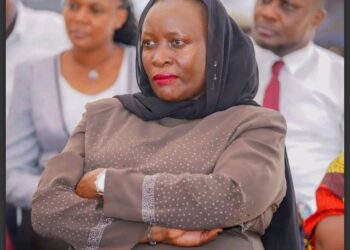The Atomic Energy Council (AEC) has continued to make strides in regulating atomic and nuclear applications in the country. Established by the Energy Act No. 24 of 2008, the council is mandated to regulate peaceful applications of ionizing radiation in Uganda; to provide for the protection and safety of individuals, society and the environment from the dangers of ionizing radiation.
Over the years, the council has developed competences and skills for its staff to carry out its work in collaboration with experts from International Atomic Energy Agency and other experts from the US and many other countries.
As Uganda gears for nuclear energy production, the council has moved ahead to train the staff in inspecting industrial radiography and other applications.
The council is also working on the project to relocate its headquarters to Mpoma in Mukono district where it has secured land to construct both administrative and staff houses, laboratories and other facilities.
Mr Noah Deogratias Luwalira, the Secretary and the Chief Executive Officer Atomic Energy Council of Uganda said the council is already developing expertise in the necessary areas to move atomic and nuclear developments forward.
“As we have always told people, in the areas of nuclear safety and security, initially we didn’t have expertise in the regulating practice to do with nuclear and radioactive sources in the country and since the council came into force, its focus is mainly to develop capacity in terms of competence and skills of the persons who will be involved in regulating practices that use radioactive sources. This involves people who will do inspections and those who will be licensing those facilities and those who will do radiation monitoring and environmental monitoring in those places that use those sources to ensure that public is safe and secure.”
He said with the introduction of industrial radiography facilities in the country, focus is moving towards equipping the team with the best skills needed to perform their duties. He said the introduction of industrial radiography poses a bigger risk if not properly regulated.
“Now in the country we have practices that use industrial radiography where they use higher activity sources and when these are not properly regulated, they can lead to dangerous situations when people are exposed. That means they will have a risk of suffering from radiation effects. So what we are trying to do is first of all to give our people skills and competence of how to regulate these practices through doing inspections properly, through authorization to be able to license the facilities using the international best standards,” he said.
Working with different agencies and partners like the international atomic energy agency, the United States nuclear regulatory commission, trainings are being conducted for the staff of the council.
“Because of the oil industry which has developed very fast, there will be a pipeline joining Tanzania and industrial radiography will be used in the joining of these pipes. So we are equipping our staff with those skills to inspect those. Our staff had some skills but of course we do retrain to cope with the best practices in the world. ”
The Chairperson of the Atomic Energy Council Dr Akisophel Kisolo said that; initially the council only had capacity to regulate the ongoing peaceful applications, but since the trend has now changed, they are also retraining the staff for nuclear energy regulations.

“When it comes to the level of preparedness as council, We now have training for staff, we have people who are trained specifically for nuclear regulations. We have about three staff members who have trained in regulatory aspects up to the level of master’s degree, but that in principle is not sufficient enough. We need to train more of those who can advise us on requirements for sites, requirements for environmental protection and other applications. As we move towards that critical development, government will need to provide more funds for these issues,” Dr Kisolo said.
Challenges
Dr Kisolo also said as a regulator, they have been working closely with the government to develop the necessary legislations to regulate peaceful use of radiation sources. He said they have had the challenges of funding, which slows down the council work.
” To be more effective we need more funding, the present level of funding is inadequate and we have put it to government that they should fund the agency to do better work.”
He also said the existing laws didn’t take into consideration the development of nuclear energy, and that there is need to either review and strengthen the existing laws, or develop new sets of laws to cater for nuclear energy.
“The existing law is not adequate enough for nuclear power development, so the atomic energy council has to work with the government in strengthening the existing law or coming up with another law for nuclear development because the existing law didn’t have much to do much with nuclear power development, so we have need to develop the capacity of our staff at the secretariat to train again in the nuclear law.
Role of Parliament.
Recently, the parliamentary committee of natural resources members had an interface with the officials of the Atomic Energy Council, to understand their operations and what it would need to move the council forward.
Hon. Herbert Edmund Ariko, the MP for Soroti Municipality said as members, they will support the council to ensure that it fulfills its mandate. He said the step Uganda is taking to go nuclear is positive and needs to be supported.
“The idea of Uganda having a nuclear energy plant is something that should have happened a long time ago therefore its more than the best time it should be happening now. In my view there is a lot of preparedness we need to do because nuclear energy in itself is a very important source of energy because it’s clean, it’s relatively cheaper than the hydro power as well as all the other forms of energy.”
He said the council should work on the misconception that developing nuclear energy means developing atomic bombs.
He said as a country, there are a number of things we must do because since nuclear energy and all atomic related engagements are regulated by the international atomic energy and nuclear energy conventions and protocols. One of them is that for a country to be able to engage in any form of nuclear energy project, it must have a regulator and that regulator as much as feasible, must be independent and must be able exercise its mandate, its regulatory work without interference from any organ or any institution of government.
“As parliament, it is our role to always review and ensure that government has accented to and domesticated these conventions because we are part of the wider framework of the UN and adherence to some of the regulations, some of the agreements and resolutions of the Security Council.”
Hon. Ariko also said the council should be elevated to full authority with financial powers to carry out its activities.
“By large the role of Atomic Energy Council has largely been misunderstood because it’s a young agency, largely because it has been operating as a subsidiary agency within the ministry of energy and mineral development. What is most critical for us to do now is to ensure that as quickly as possible; the atomic energy bill needs to be introduced to parliament. Once introduced, as committee of natural resources we scrutinize this bill, we align it to the provisions of the local and international laws related to atomic energy and ensure that our report gets back to the parliament within the shortest time possible so that it is in line with the roadmap of Uganda moving towards nuclear energy production.”
The legislator said the elevation will give the council the financial muscle to carry out its work without undue cuttings in the funding.
“Currently it operates as a subvention, its budget is presented under the one of ministry of energy and mineral development, it’s subjected to other competing sub sectors within the ministry and therefore being the smaller one, most of the time you find the agency suffers because once the ministry doesn’t look at its work as a priority then the funds are diverted. So as a committee we want to ensure that the AEC has its own vote, independent of the vote of the ministry.
He also agreed with the chairperson of the council that the law needs to be reviewed, saying “it needs to be assessed and needs to be scrutinized so that the provisions are aligned by the natural resources committee of the parliament and taken to the floor of parliament so that we have a new act that will regulate atomic energy as soon as possible. We must pass an act that ensures that the Atomic Energy Council stands as a statutory constitutional body mandated to carry out its roles with independence.”
With the proposal to move its headquarters to Mpoma in Mukono district, Hon. Ariko hopes that the council will be in a better position to carry its mandate.
“The second thing for us to look into is the institutional and infrastructure development of the council because it cannot continue to operate under the umbrella of the ministry. We have seen that the council has already acquired land where it hopes to set up its laboratories, technical centre, but more so, a home for itself. What is now challenging is lack of funds to start work at the site. We need to support them acquire this particular facility so that its technical as well as operational work can be housed in its own home,” he said.
Hon. Ruth Katushabe, MP for Bukomansimbi North who also sits on the natural resources committee said the engagements with the council has been a positive one and hopes better things will come out of it.
She however, said like many Ugandans out there do not understand the difference between nuclear energy and nuclear bomb.
“I was one of the Ugandans that were worried because I didn’t know why we needed the council. When you talk about atomic energy, one thinks about the nuclear bombs, which are very destructive. However, when we engaged with the council, we realized that the country needs the council. We realized that we need to support the council to do its role, especially the regulatory role because if they are not supported financially it can be dangerous.”
Plans are already under way to move the council headquarters. Initially the facility generated much discussions with the locals rejecting the project. However, discussions and sensitization are on going, the issues are being handled. The council says it will start constructions as soon as funds are secured.
Do you have a story in your community or an opinion to share with us: Email us at editorial@watchdoguganda.com












